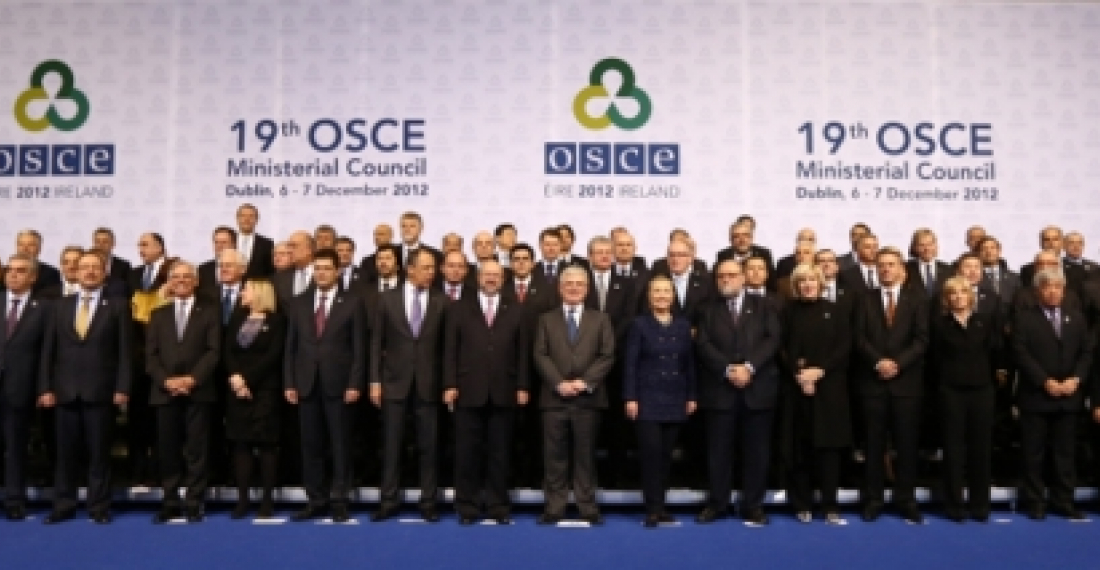A commentary prepared by the political editor of commonspace.eu
The OSCE - the Organisation for Security and Co-operation in Europe, has earned for itself the dubious honour of being the least transparent international or regional organisation in Europe. Mind you it is not through any lack of press releases, websites or other paraphenelia of mass communication. There are plenty of those, and the press rooms of the annual foreign minister's meetings are always filled with hundreds of journalists. But the culture of the organisation results in documents that are masterpieces of ambiguity and innuendo. Most decisions are extremely general, and usually end by referring the issue back to an organ called the Permanent Council, a body of diplomats representing each of the 57 member states which meets weekly in Vienna.
Two factors contribute to this culture. The OSCE works on the principle of consensus, and getting agreement from 57 member states on anything is very difficult indeed. The Foreign Ministers have stoped even trying to issue a statement after their annual meeting. Instead they, limit themselves to issuing a serious of "decisions" many of which are purely of an administrative nature, such as who assumes the annual chairmanship of the organisation, and the date of the next meeting. Anything else has to be necessarily ambiguous in order not to offend anybody's sensibilities.
The second problem is that the work of the organisation is often considered too "technical" for mere mortals. Instead the most boring and pedantic diplomats are often deployed to Vienna, away from the public eye, to beaver on the produiction of documents, most of which are never agreed on, and never see the light of day.
But the OSCE is important because it is the one forum where all the European countries - together with their North American and Central Asian neighbours, sit together to try to work out Europe's security. Its work also has historically embraced core security issues such as arms control as well as work in the area of the human dimension. It basis its logic on the principle that security is indivisible.
The OSCE also has a glorious history since it is a direct descendant of the CSCE - the body that gave us the 1975 Helsinki Final Act, which is often seen as the begining of the end of the cold war in Europe, and which many associate with Europe's achievements in the field of human rights.
It is perhaps in an effort to capture some of this past glory that the OSCE Foreign Ministers meeting in Dublin last week decided to launch what they are calling "The OSCE Helsinki+40 process". A decision was duly adopted. It says that the new process is "an inclusive effort by all participating states to provide strong and continuos political impetus to advancing work towards a security community, and further strenghtening our co-operation in the OSCE on the way towards 2015, a year that marks four decades since the signing of the Helsinki Final Act." The document also states that the Foreign Ministers "Stressing that this special anniversary represents a unique opportunity to reaffirm the participating states' committment to the concept of comprehensive, co-operative, equal and indivisible security by recording practical results reflecting intensified efforts to fully implement OSCE committments and to reconfirm and build upon the OSCE achievements across the three dimensions, and to meet the challenges of the twenty first century."
In essence what the Foreign Ministers did last week was to send the organisation back to the drawing board and to launch a three year discussion on how to re-organise its work for the future. A very good thing indeed, except that it is difficult to see how the people who have created the present OSCE culture are going to be the one that change.
The only hope for this to work is if the three incoming chairmanships of the OSCE: Ukraine (2013) Switzerland (2014) and Serbia (2015) take this task seriously and develop a startegy whereby they could reach out beyond the permanent Council in Vienna to the wider society in the OSCE space to ensure that the vision for the 21st century is one that reflects the reallity of the hundreds of millions of people in the space from Vancouver to Vladivistok whose future it seeks to secure.
Their have been rumblings of discontent with the performance of the OSCE in recent years. It has failed to deliver on a number of issues. This new process of renewal needs to be serious and open if the organisation is to redeem itself. The arguments that it does not cost too much, and that it is better to have it then not to have it may not be sustainable for too much longer, so in many ways the Helsinki+40 process offers the OSCE with an existential challenge.
This commentary was contributed by the political editor of commonspace.eu
photo: The Foreign Ministers of the 57 member states of the OSCE at their 19th Ministerial Meeting in Dublin on 6-7 December 2012. (picture courtesy of the OSCE)







